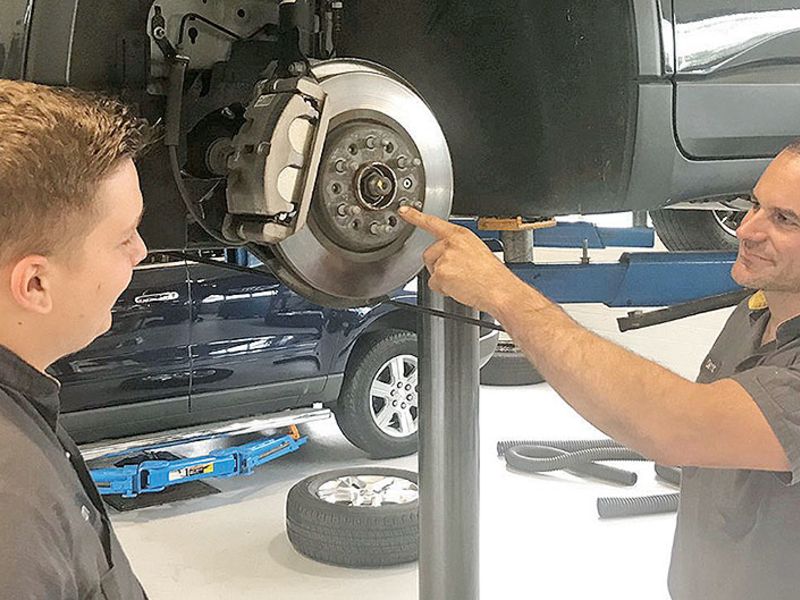
John Komar and Greg Long, Faulkner Automotive Group’s fixed operations directors, are on the front lines of recruiting technicians in Philadelphia’s brutally competitive market. Each of Faulkner’s 28 dealerships need at least one tech.
It’s not easy, quick or inexpensive for them to find and hire techs. According to consulting firm DealerStrong of Evansville, Ind., franchised new-car dealers spend as much as $10,000 to recruit new technicians — a figure that covers the hiring process from writing the job description through onboarding.
So, the last thing Komar and Long want to see is a new tech fail. To help ensure that doesn’t happen, Komar and Long, working with the group’s service managers and master technicians, relaunched Faulkner’s technician mentor program in 2019. Newly hired technicians — most of whom are just out of school — are paired with master technicians for their first nine months. The new techs are eased into their jobs in a cadence designed to build confidence, produce high-quality work and immerse them in Faulkner’s culture.
The service departments are kept very clean and well organized. Faulkner techs learn to be good communicators. They might make cellphone videos for customers showing and explaining why repairs are needed. At some Faulkner stores customers can watch their vehicles being repaired; techs always wear clean uniforms and look and act professional.
Komar and Long felt the company could do better in helping new hires learn their jobs.
“In the past we’ve had different levels of success. A lot depended on the person coming in, how strong and resilient they were,” Komar said. “What we found is that the new generation is looking for a different life than we were 30 or 40 years ago. As time went by, we were less successful, and we decided to reinvent it.”
When a technician starts at a Faulkner dealership, he or she is given goals based on skills and experience, and regular reviews. Those “checkpoints,” Komar says, have been key to ensuring a smooth transition from trainee to regular tech. They involve such things as working safely, becoming proficient at using the store’s dealer management system and mastering their tools. Trainees earn raises as they progress through the program. Communication is the linchpin that makes it all work.
“Rather than just saying there’s your bag, there’s your toolbox, go to it and we’ll talk to you in six months, there is a lot of constructive back-and-forth conversation between the service manager, mentor and trainee,” Komar said.
Derrick Wenger, 41, a senior master technician and mentor at Faulkner Chevrolet Lancaster, knows it’s stressful for trainees working on customers’ cars for the first time.
“I try to get them over that by establishing routines quickly,” says Wenger. “If they have a routine when they bring a car into their bay, the sooner they go through a process, it becomes a pattern and it is not intimidating. Starting with simple tasks and accomplishing them well establishes confidence and makes it easier to move them on to more difficult tasks.”
As Komar and Long interviewed Faulkner’s master techs and service department managers on ways to improve the mentor program, they discovered some older techs had unfulfilled career needs. Says Komar: “We’re talking about guys who are a little older coming to you and saying, ‘What’s my next step?’ You never want to tell someone who’s been loyal to you for all those years, ‘Sorry, I have nothing for you, you’re out.’ How do you leverage that knowledge, for them and for the business?”
Mentoring appealed to Wenger: “I always enjoy seeing other people learn new things, grasp ideas and grow. I find it rewarding.”
Keegan Martin, 20, who graduated from Thaddeus Stevens College of Technology in Lancaster this spring, is training with Wenger. Martin, who worked at the Chevy store as a porter before he finished school, learned about the program during his job interview.
“For the first day or two it was nerve-wracking. It’s a close-knit group of guys. But everyone was friendly and open to me,” Martin said. “I have told people I have learned more from Derrick than I may have at school.”
Komar says the five trainees in the stores he oversees who have completed the program are now full-time techs excelling in their jobs.
The mentor program is part of Faulkner’s effort to permanently solve its tech shortage.
The company has committed $1 million to a local high school’s technician training program whose first graduates will arrive in about three years.

